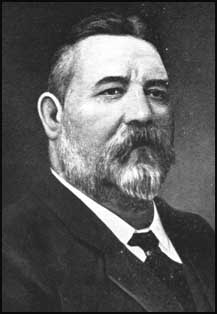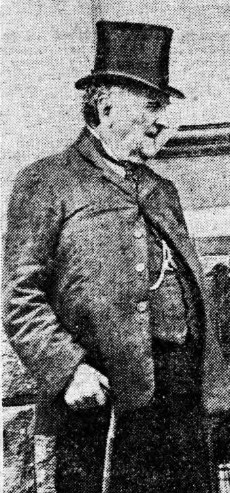Related Research Articles

Aberdare is a town in the Cynon Valley area of Rhondda Cynon Taf, Wales, at the confluence of the Rivers Dare (Dâr) and Cynon. Aberdare has a population of 39,550. Aberdare is 4 miles (6 km) south-west of Merthyr Tydfil, 20 miles (32 km) north-west of Cardiff and 22 miles (35 km) east-north-east of Swansea. During the 19th century it became a thriving industrial settlement, which was also notable for the vitality of its cultural life and as an important publishing centre.

Henry Austin Bruce, 1st Baron Aberdare, was a British Liberal Party politician, who served in government most notably as Home Secretary (1868–1873) and as Lord President of the Council.

Merthyr Tydfil is the main town in Merthyr Tydfil County Borough, Wales, administered by Merthyr Tydfil County Borough Council. It is about 23 miles (37 km) north of Cardiff. Often called just Merthyr, it is said to be named after Tydfil, daughter of King Brychan of Brycheiniog, who according to legend was slain at Merthyr by pagans about 480 CE. Merthyr generally means "martyr" in modern Welsh, but here closer to the Latin martyrium: a place of worship built over a martyr's relics. Similar place names in south Wales are Merthyr Cynog, Merthyr Dyfan and Merthyr Mawr.

The South Wales Valleys are a group of industrialised peri-urban valleys in South Wales. Most of the valleys run north–south, roughly parallel to each other. Commonly referred to as "The Valleys", they stretch from Carmarthenshire in the west to Monmouthshire in the east; to the edge of the pastoral country of the Vale of Glamorgan and the coastal plain near the cities of Swansea, Cardiff, and Newport.

Stephen Owen Davies was a Welsh miner, trade union official and Labour Party politician, the Member of Parliament (MP) for Merthyr Tydfil, previously Merthyr for nearly 38 years, from 1934 to 1972. In 1970, well past 80, he was deselected as parliamentary candidate by his local party association because of his age. He fought the election in the 1970 general election as an independent candidate and won comfortably, a rare example in British politics of an independent candidate defeating a major party's organisation. In a BBC TV interview the day after that election, he claimed to be 83 years old.

William Abraham, universally known by his bardic name, Mabon, was a Welsh trade unionist and Liberal/Labour politician, and a member of parliament (MP) from 1885 to 1920. Although an MP for 35 years, it was as a trade unionist that Abraham is most well known. Initially a pioneer of trade unionism, who fought to enshrine the principle of workers' representation against the opposition of the coal-owners, he was regarded in later life as a moderate voice believing that disputes should be solved through conciliation rather than industrial action. This drew him into conflict with younger and more militant leaders from the 1890s onwards. Although the defeat of the miners in the Welsh coal strike of 1898 was a clear defeat for Mabon's strategy, his prestige was sufficient to ensure that he became the first president of the South Wales Miners' Federation which was established in the wake of the dispute. Abraham was noted for his powerful speaking voice, and was a renowned orator in English and Welsh.

The South Wales Miners' Federation (SWMF), nicknamed "The Fed", was a trade union for coal miners in South Wales. It survives as the South Wales Area of the National Union of Mineworkers.

Thomas Price was a leading figure in the political and religious life of Victorian Wales, and the central figure of the Cynon Valley for more than forty years.
David Williams (1809–1863), known by his bardic name Alaw Goch was a prominent coal-owner in the Aberdare valley and also a keen supporter of Welsh culture and the eisteddfod.

Siloa Chapel was the largest of the Welsh Independent, or Congregationalist, chapels in Aberdare. Services are held in the Welsh language. Established in 1844, Siloa is one of the few Welsh-language chapels in the locality to remain open today. Siloa was notable for its long-serving ministers and in over a century there were only three pastorates, namely those of David Price (1843–1878), D. Silyn Evans (1880–1930) and R. Ifor Parry (1933–1964).
The Aberdare strike of 1857–1858 was one of the first significant industrial disputes in the history of the steam coal trade of South Wales. The origins of the strike lay in the decision of the employers to impose a wage reduction of up to 20%, as a result of the general depression in trade in the aftermath of the Crimean War. During the dispute a trade union appeared amongst the miners of the Aberdare Valley but the men were ultimately forced to return to work on the terms set by the owners.
David Morgan was a Welsh miners' agent and trade unionist who played a prominent role in the history of industrial relations in the South Wales Coalfield from the 1870s until his death in 1900.
The Amalgamated Association of Miners (AAM) was formed in 1869 in Lancashire, at a time of increasing industrial conflict in the British coalfields.

Thomas Halliday was a British trade unionist.
The Cambrian Miners' Association, also known as the Rhondda District Miners' Association, was an early trade union representing coal miners in the Rhondda Valley, in Wales.
The Monmouthshire and South Wales Miners' Association was a trade union representing coal miners in south eastern Wales.
The Western Miners' Association was a trade union representing coal miners in parts of South Wales, centred on Neath.
The Ebbw Vale and Sirhowy Colliery Workmen's Association was a trade union representing coal miners in the Ebbw Vale area of South Wales.
The Anthracite Miners' Association was a trade union representing coal miners in parts of Carmarthenshire, Glamorgan and Breconshire, in South Wales.
John Davies was a Welsh politician and trade unionist, who served as Mayor of Merthyr.
References
- ↑ "The Threatened Strike Amongst the Colliers". Aberdare Times. 2 April 1870. p. 4. Retrieved 20 January 2023.
- ↑ Jones 1984, pp. 200–01.
- ↑ "Great Meeting of Colliers at Aberdare". Aberdare Times. 10 February 1872. p. 4. Retrieved 10 March 2014.
- ↑ "Amalgamated Association of Miners". Cardiff Times. 11 October 1873.
- ↑ Pretty 2001, p. 507.
- ↑ Arthur Marsh and Victoria Ryan, Historical Directory of Trade Unions, vol.2, pp.201-258
- ↑ Robin Page Arnot, South Wales Miners, p.60
- ↑ Pretty 2001.